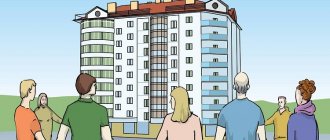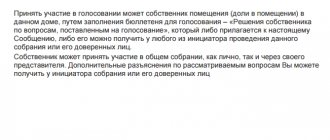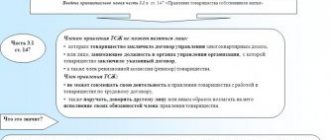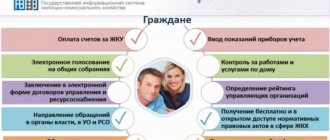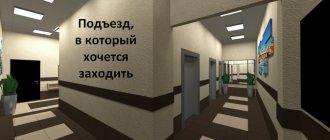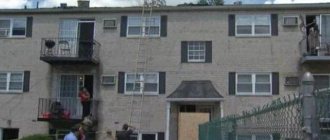How to properly conduct a general meeting of owners of an apartment building
Decisions of the general meeting of owners often become the subject of heated discussions between residents of the building. Their intensity can reach a dangerous point if some of the owners do not agree with the results of voting on vital issues - for example, on the choice of management method and management organization. Passions, as a rule, are fueled by third parties (for example, representatives of the “flying” management company), loud but unsubstantiated accusations of forgery of documents are heard, numerous appeals are written to various supervisory authorities and courts... in general, the situation begins to resemble a soap opera.
Let’s be honest: often the initiators of the meeting themselves contribute to this, making mistakes both in the procedure for conducting the OSS and in the preparation of documentation. However, the endless “Santa Barbara” is good only on television; in life, people are more pleased with peace, comfort and safety. Therefore, our conversation today is about how to properly hold a general meeting of owners of an apartment building and, no less important, how to legally formalize its results.
We manage it ourselves!
Let's start with the main thing: the general meeting of owners (GMS) didn't just make some noise and disperse. Part 1 art. 44 of the Housing Code of the Russian Federation defines the OSS as the management body of an apartment building (MKD). And its decisions, in theory, are obliged to implement by all owners, even those who, according to the voting results, were in the minority. And those who categorically do not want to obey the decisions of the OSS have an excellent alternative: buy a house and live there exclusively according to their own rules.
Some may be surprised, but the legislator has established an obligation for owners to conduct OSS at least once a year (Part 1 of Article 45 of the RF Housing Code). All meetings held other than the mandatory annual one will be considered extraordinary.
It is quite natural that the competence of the general meeting includes issues related to the existence and functioning of apartment buildings: reconstruction of the house, the method of forming a capital repair fund, election of the House Council and its chairman, choice of management method and management organization, approval of tariffs for the maintenance and ongoing repairs of apartment buildings. This, of course, is not all: everyone can familiarize themselves with an exhaustive list of issues within the competence of the OSS by reading Art. 44 Housing Code of the Russian Federation.
It is logical that only the owners of premises in a given building can take part in the general meeting, that is, vote. Since the beginning of this year, a norm has appeared in the Housing Code of the Russian Federation concerning residents of new buildings: according to Part 1.1 of Art. 44 of the Housing Code of the Russian Federation, those citizens to whom the developer transferred the premises under a deed, but who have not yet managed to properly formalize ownership rights, also have the right to participate in the OSS. This right is retained by them for a year from the date of issue of permission to put the apartment building into operation.
It is important to understand two more points. First: the general meeting of owners is authorized to make decisions only on those issues that are assigned by the legislator to the competence of the OSS and related to the operation of the house. For example, even if residents unanimously vote for a vote of no confidence in the current mayor of the city, this decision will have absolutely no legal consequences. And the second point: decisions of the general meeting of owners cannot contradict current legislation.
From form to content
Art. 44.1 of the RF Housing Code provides for three forms of holding a general meeting of owners. The first is in-person voting (also called the co-presence form). Everything is simple here: the owners get together, discuss the issues on the OSS agenda, after which everyone makes a decision on them. This form of meeting is excellent for everyone, with the exception of one important nuance: it is very problematic to gather at one time and in one place the number of owners required for a quorum: someone disappears at work, someone has urgent summer affairs, others have certainly decided to drink with friends, etc.
In order for decisions important for the common home to be made, the legislator condescended to the needs and weaknesses of the owners and introduced absentee voting. It is carried out either by polling (owners vote in voting decisions on items on the meeting agenda and submit them within the prescribed period to the address specified in the notification about the OSS), or using the GIS housing and communal services system. However, voting using the system, the procedure of which is regulated by Art. 47.1 of the RF Housing Code deserves separate consideration, so we will not talk about this in detail now. In addition, in Moscow, St. Petersburg and Sevastopol, this norm will come into effect only from July 1, 2020.
Finally, the third form of OSS, provided for by the Housing Code of the Russian Federation, is in-person and absentee voting. That is, first the in-person part of the general meeting is held and, if a quorum is not reached, the voting automatically switches to absentee voting. This is perhaps the most common form of OSS at the moment. We will mainly talk about it in the future.
We notify the owners
According to Art. 45 of the Housing Code of the Russian Federation, the initiator of the OSS can be any owner of the premises in a given house. That is, both you personally and any of your neighbors are endowed with such a right, the main thing is that the premises (or part of it) are owned, and no approval is required from the council of the house or its chairman. Accordingly, if a building has apartments that are departmentally owned, then the department, like all other owners, has the right to initiate an OSS. Also, the initiator of the general meeting can be the management organization that services the designated house under a management agreement.
The law requires that the initiator of the meeting notify other owners of its holding no later than 10 days before the appointed date. There is a subtlety here: as Part 4 of Art. 45 of the Housing Code of the Russian Federation, a notice of the OSS must be sent to the owners by registered mail, unless the decision of the previous meeting provided for another method of written notification. However, the Russian Post does not work perfectly, to put it mildly, so try to send letters no later than 20 days before the meeting, although this period does not always help owners receive notifications about the meeting. Also, the notification of the OSS can be delivered to the owner personally against signature. However, this method of notification is almost never used, and if it is used, such meetings are very easily declared invalid due to the impossibility of notifying 100% of the owners.
There are also other notification options: for example, a notice about the OSS can be posted in a room accessible to all owners. But there is a nuance here: this method of notification must be fixed by the decision of one of the previous OSS, and if there was none, it will not be suitable. In addition, if the agenda of the meeting is potentially conflicting (for example, we are talking about choosing a new management company), you need to understand that your notice will not last long...
Let us summarize: in practice, taking into account all the above subtleties, to guarantee compliance with the notification procedure, it is more advisable to use only one method - registered mail.
To send out notifications, of course, you need a register of owners of apartment buildings. Part 3.1 art. 45 of the Housing Code of the Russian Federation imposes on the management organization, HOA or housing cooperative the obligation to maintain this register and, upon written request, provide it to the initiator of the general meeting within five days. Moreover, the consent of the owners to provide such information is not required. However, if at the OSS we are talking about changing the management company, then the current management company may take a “long pause to think” and not provide data. Therefore, we will also tell you about alternative ways to obtain a register of owners. Firstly, you can quite officially order it from Rosreestr. Secondly, this can be done online through many specialized companies (Google can help), which will independently make a request to Rosreestr and send you the results. Now - the fly in the ointment: in both cases this service is paid, and if there are, say, more than 30 apartments in the building, then the register of owners will cost a hefty sum.
Now it’s clear, point by point, what information should be contained in the OSS message:
- Information about the initiators of the meeting;
- Form of conducting OSS (full-time, part-time, part-time and part-time);
- Date, place and time of the meeting. If this meeting is held in the form of in-person or absentee voting - the closing date for accepting decisions of the owners, as well as the place or address where the said decisions should be transferred;
- Agenda of the general meeting of owners;
- The procedure for familiarizing yourself with the information and (or) materials that will be presented at this meeting, as well as the place or address where they can be viewed.
What is important to remember: as follows from Part 2 of Art. 46 of the Housing Code of the Russian Federation, the general meeting of owners cannot make decisions on issues not included in the agenda of this meeting, or change the agenda originally stated in the notice of the general public meeting. Let us explain with an example: if, for example, the agenda indicated in the notice does not contain questions about changing the method of managing the apartment building or about choosing another management organization, then these questions cannot then “pop up” in voting decisions, and even more so in the protocol OSS.
In-person part of the OSS: we cut off provocateurs
Finally, day X arrived, and at the appointed time, the residents of your house pulled up to the appointed place. Well, let’s be realistic: not everyone has caught up, or rather, a minority. Be that as it may, you are trying to open a meeting and start a conversation on the merits, but strangers take the initiative from you, who may introduce themselves as concerned residents of neighboring houses, social activists and even deputies of local authorities. This scenario is most likely if one of the issues on the meeting agenda is a change of management organization. Incoming well-wishers, as a rule, immediately begin to “expose” the potential management company, praise other companies, interrupt, silence all those who disagree, as a result of which the meeting gradually turns into a farce...
Congratulations: you have encountered one of the technologies of competition between management organizations - provocateurs. Their goal is to disrupt the general meeting of owners by any means. Well, your goal, on the contrary, is to conduct the meeting constructively and in full compliance with the law. Therefore, when the situation begins to get out of control, ask the residents of your house to register in the list of owners present at the general meeting (this document, according to the order of the Ministry of Construction of the Russian Federation dated December 25, 2020 No. 937/pr, is a mandatory appendix to the OSS protocol) . Politely but firmly ask guests to smoke on the sidelines and not interfere in the discussion of issues that concern only the residents of your house. If they don’t understand in an amicable way, they continue to make trouble – call the police.
Meters vote!
So, the provocateurs have been neutralized, now we move on to calculating the quorum (remember: now we are talking about the in-person and absentee form of OSS). It is important to understand that owners can vote either personally or through their representatives, who must have a notarized power of attorney to vote. We also remember that, according to Part 3 of Art. 45 of the Housing Code of the Russian Federation, the general meeting is valid (has a quorum) if the owners of the premises or their representatives with more than 50 percent of the votes took part in it. However, there is a nuance here: Part 3 of Art. 48 of the Housing Code states that the number of votes that each owner of the premises has at a general meeting is proportional to his share in the common property. That is, the owner of a three-room apartment has a larger share in the common property than the owner of a one-room apartment, which means he has more votes. And it is the shares, and not the number of voting owners, that are taken into account both when calculating the quorum and when counting the total votes.
If there is a quorum, then first the chairman of the meeting, the secretary and the counting commission are elected, and only after that can we proceed to discussion and voting on the issues on the OSS agenda. You need to know that voting in absentia or in person at the general meeting, in accordance with Part 4.1 of Art. 48 of the Housing Code of the Russian Federation, “is carried out through written decisions of the owners.” However, in the overwhelming majority of cases, a quorum is not reached during the face-to-face part of the meeting—it’s no joke to gather half the residents of, say, a two-hundred-apartment building in the yard. If this is the case in your case, then the initiator directly announces that a quorum has not been reached and voting goes into absentee form. And from this moment the correspondence part of the meeting starts.
Here you and your like-minded people hold all the cards: during the correspondence part of the OSS, you have the opportunity to personally talk with each owner calmly, reasonedly, without the background of visiting well-wishers. Convince, but don't go overboard. The voting period is set arbitrarily by the initiators of the meeting: at least two days, at least two months. It is clear that the more owners there are in an apartment building, the more time it will take to work individually with them. Start from this.
Documents of the general meeting of owners
Provocateurs, and even owners simply dissatisfied with the decision of the OSS, often declare: they say that the minutes of the meeting were forged, the signatures of the owners were obtained fraudulently! Some people believe them, primarily because they have no idea about the documents accompanying the general meeting of owners. What kind of documents are these?
There are several of them, the requirements for them are set out both in the Housing Code of the Russian Federation and in the already mentioned order of the Ministry of Construction of the Russian Federation dated December 25, 2020 No. 937/pr. There is no point in talking about everything within the scope of this article, so let’s focus on the main ones.
The content of the message about the OSS was discussed above, so there is essentially nothing to add here. The next important document is the list of owners of premises in an apartment building who were present at the general meeting; it is a mandatory appendix to the minutes of the OSS. This list, according to the requirements of the order of the Ministry of Construction, must contain the full name of the owner, the number of the premises belonging to him, details of the document confirming ownership, the number of votes that this person has and - oh, horror! - his autograph. This document is most often defamed by provocateurs and illiterate people: they say, the villains are forcing you to sign somewhere, and then it turns out that you voted for something... Your task is to calmly explain to people that their signature in the said list only means that that they were present at the meeting. This document has absolutely nothing to do with voting.
The owner’s will on issues on the OSS agenda reflects the voting decision. As follows from Part 5.1 of Art. 48 of the RF Housing Code, the decision must include:
- Information about the person participating in the vote;
- Information about the document confirming the ownership of the person participating in the vote to the premises in the corresponding apartment building;
- Decisions on each item on the agenda, expressed in terms of “for”, “against” or “abstained”.
As you can see, the voting decision is a strictly individual document; no “list” voting is provided for at the OSS. And it is even more incomprehensible how the owner’s signature on a decision can be obtained fraudulently: a person votes independently and clearly sees what he is signing for.
Finally, the minutes of the general meeting of owners. The comprehensive requirements for this document are set out in the same order of the Ministry of Construction of the Russian Federation dated December 25, 2020 No. 937/pr. Anyone interested should read it. It is important to remember that the minutes of the OSS must be drawn up no later than 10 days after the end of the meeting. Neighbors should also be informed of the voting results and decisions made no later than 10 days from the date the said decisions were made. This is done as required by Part 3 of Art. 46 of the Housing Code of the Russian Federation, “by posting an appropriate message about this in the premises of a given house, determined by a decision of the general meeting of owners of premises in a given house and accessible to all owners.”
What's next?
According to Article 46 of the Housing Code, the originals of the decisions and minutes of the general meeting of owners (together with all appendices established by order of the Ministry of Construction of the Russian Federation dated December 25, 2020 No. 937/pr), the initiators of the OSS are obliged, no later than 10 days after the meeting, to transfer to the management organization ( HOA, housing cooperative). The most important thing here is that the current version of the Housing Code does not indicate which specific management company needs to transfer the original documents - the current management company or the one chosen in the vote. Because if you transfer the originals to an existing organization, they may well get “lost” there so that the house does not go to competitors. So this loophole allows you to protect the safety of the protocol and decisions by sending them to the selected management company, which, in turn, must send these documents to the State Housing Inspectorate within 5 days from the date of receipt. With the direct management method, a package of documents is transferred directly to the State Housing Inspectorate.
That's all, actually.
As you can see, there is nothing supernatural or extremely complicated in holding a general meeting. However, if you do not take into account all the nuances, the likelihood of errors in the procedure and documentation is quite high. And if the agenda of the meeting is conflicting (for example, there is a question about choosing a new management company), your opponents will not fail to take advantage of these mistakes. However, in this regard, we have good news for you: if you think that the management company working in your home is not coping with its responsibilities, and you want to change it, contact us! Our specialists will conduct a market analysis and select the best option for a management company for your home, and will also help provide legal support for the transition. This service is free for owners, so it would be a shame not to use it!
What was discussed
A list of questions was prepared to which I wanted answers from the Chairman:
- Why has the “Content” line not been reduced due to a separate payment for the “MSW management” line since January 2020?
- What should be the tariffs for heating (and indeed for everything) and why are different tariffs indicated in the receipt for January? I suggest not waiting for the recalculation in February, but replacing the receipts on Monday (we have an accountant).
- What is the current list of members of the Board? Please provide a certified copy of the composition of the Board for publication on the website. Please provide a certified copy of the HOA Charter for publication on the website. What other list of documents can be published there? I’m waiting for a proposal from the Board.
- On the GZHI website (https://ezhkh.gzhi-samara.ru/?r=site/houseInfo&id=18584291) it is indicated that the house is managed by the company Strong - Service:
a) Why did this happen? b) Why were residents given a receipt from the HOA? c) On what basis does the Chairman not transfer the keys to the premises and the documentation necessary for managing the house to the Strong-Service company? After all, residents made their decision on the issue of the management company. d) Will the Chairman hand over the keys and documents after the conclusion of agreements between RSO and Stronge? - Please provide the Board with a report on financial and economic activities for 2020 for verification before presenting this report at the General Meeting of HOA members.
- Inform about the deadlines for submitting the report for 2020.
- Why doesn't the snow fall away from the blind area of the house?
Procedure for conducting absentee voting
Owners' decisions are made on the basis of a quorum. This means that in order to resolve the problems identified on the agenda, a certain percentage of votes of the owners of all apartments in the building is required. Typically, this percentage should be more than 50 of the total number of votes.
If, after voting held in person, a quorum is not recorded (the decision has not been made), then it is necessary to announce the beginning of a new collection of votes.
There is no point in holding another face-to-face meeting - if quorum was not reached on the first attempt, then repeating the procedure will most likely not change anything. For such cases, there is a system of absentee voting, which is announced immediately after a failed in-person collection.
Absentee voting is much more convenient for homeowners. It can be carried out in paper or electronic form (through the GIS Housing and Communal Services). At the same time, no one is rushing the owners to make decisions - a certain period is allotted for absentee voting, during which they can consider various options without pressure from other residents.
Owners vote in absentia if there is no quorum at the initial meeting of residents - the initiators of the meeting received less than 50% of the votes.
The rules for organizing and conducting absentee voting are regulated at the legislative level - you cannot deviate from it, otherwise apartment owners will be able to challenge the decisions made in court (Article 47 of the Housing Code of the Russian Federation). Here's how absentee voting is conducted for homeowners in an apartment building:
- The initiator announces a meeting of owners. For this purpose, an announcement is drawn up and posted in all public places (elevator, information stand, notice board). The information message must indicate that the collection of votes will take place in absentia.
- Official notices are sent to all owners. Notifications are delivered in person (with signature on receipt) or in the form of a registered letter. The main thing is that the initiators of the meeting have recorded data on the receipt by apartment owners of notifications about the upcoming absentee voting. The notification indicates the initiator of the meeting, forms the agenda and determines the deadline for collecting votes. All documents related to the agenda must be available for review.
- Owners receive decision ballots in hand (against signature). Now the task of residential/non-residential property owners is to familiarize themselves with the contents of the bulletin and make an informed decision. There are three voting options: “for”, “against”, “abstained”. It is not allowed to answer in any other way or write down a detailed answer. Any questions that the owner does not answer according to the rules will not be counted. Typically, the decision is presented in the form of a table with three corresponding cells, so it will not be difficult for the owner of a residential property to answer correctly by checking the required box.
- Owners submit completed decisions. Time for absentee voting is limited. All decisions of the owners are official documents and have legal consequences.
- The initiator of the meeting formalizes the results of absentee voting and informs residents about the decisions made. The minutes of the general meeting of owners are posted in information corners and on notice boards. The protocol must be prepared and posted within 10 days after the closing date for receiving ballots.
Absentee voting by owners can only be carried out according to this scheme. The initiator of the meeting is obliged to ensure information openness on all issues discussed.
The notification must indicate the address where owners can review the accompanying documents and technical materials. Residential property owners, in turn, must provide correct answers to all questions listed in the decision.

